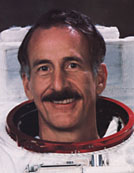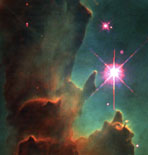|
Jeffrey Hoffman
–
astronaut & astrophysicist
|

|
"
The people there must have a purpose, and that purpose must be more
than just simple survival."
|

|
| |
|
|
|
| |
How were you originally motivated to become an astronaut? |
| |
When I was a small boy in New York City, my father took me to the Hayden
Planetarium every month. I was captivated by all that I saw, even
though the time period was pre–Sputnik. I was fascinated by astronomy
and loved to look at the stars and planets. I often drew pictures
of rockets and even tried to make a small liquid rocket in my
basement; but when I showed my father what I was doing, he realized how
dangerous it was and put a stop to those experiments.
I read a lot and wondered about the future of space travel. Some of
what I read was science fiction, but more of it was about real science
and how it worked. I remember how excited I was when I saw the first
Sputnik fly over our high school football field. I did well in school and
eventually went on to get a PhD in astrophysics at Harvard, after which I
spent the next 10 years doing research in astrophysics, as well as helping
to get X–ray telescopes placed into satellites. Then, when NASA asked in
1997 for scientist astronaut candidates to fly on the Space Shuttle, I
applied and was selected in 1978.
|
|

|
| |
|
|
|
| |
What qualities are important in becoming a first–class astronaut? |
| |

|
|
These qualities fall into three areas – physical, intellectual, and
emotional. Physically, one does not have to be an olympic athlete, but
it is very important to be in good overall health and take care of oneself.
Exercise and a healthy diet are obvious factors. You must be in
reasonably good condition to cope with working in a stressful
environment and the other rigors of space flight.
On the intellectual side, I read a great deal, always trying to stay
informed about what's going on in space matters. Naturally, it is
crucial to be educated in such basics as math, physics, biology,
computers, and really most of the sciences. It is also important to
have experience with at least one other culture, including learning to
speak another language. One must demonstrate a general level of excellence
and also be adaptable.
On the emotional side, it is vital to be able to function under
stressful conditions, including even those that are physically
dangerous. And again, it is important to be able to work with other
cultures and as part of a team. A given astronaut may be very talented
as an individual, but this must not be at the expense of functioning
effectively as a team member.
|
|
| |
|
|
|
| |
What ideas can you suggest for a future human community on Mars?
|
| |
The people there must have a purpose, and that purpose must be more than
just simple survival. Initially, there is bound to be much
exploration and scientific research, but over time an infrastructure
must be established to permit a goal that involves the work of more than
just astronauts and scientists. As an aside, astronauts are human
beings and must be allowed to take along whatever personal things they
wish, not just physical articles but also their personal and cultural
traditions.
It is important that the community be large enough to have a complete
skill mix and human richness for dealing with both survival and culture
on Mars. The latest state–of–the–art communications technology must be
employed to enjoy what's happening back on Earth. There will be many uses
for robots to support the community. It will be necessary to decide
whether people are "short–timers" or plan to stay on Mars for long enough
to bear and raise children. Once children are part of a colony, the colony
can be considered "permanent".
Some amount of international law may have to be taken along. If people
were "ideal", little law and no lawyers would be necessary. But as humans
have not yet achieved that state, some law will be required, as well as
perhaps a judge or two . All in all, there will be many challenges in
designing a vital community that can pass the test of time and endure as a
positive and rewarding outpost on another world such as Mars.
|
|

|
|




